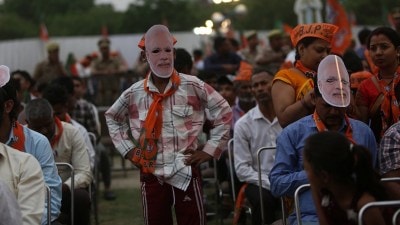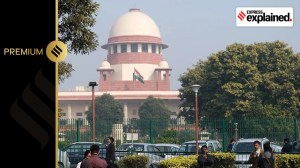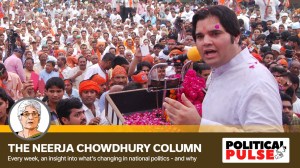- India
- International
Tamil Nadu’s NDA jigsaw
A day after the BJP stitched together a six-party alliance in Tamil Nadu to take on the state’s two main players - AIADMK and DMK.
Desiya Murpokku Dravida Kazhagam (DMDK)
Being the only one in the group that can claim to have a vote bank across the state, the party floated by actor-turned-politician Vijayakant, was expected to bargain hard for a lion’s share once the discussions moved to seat-sharing. At the end, the party cornered 14 seats, including five from where it had won over a lakh votes in 2009, and another two with over 90,000.
With the DMK and the AIADMK holding 20-30% vote share, the Congress (and its splinter, Tamil Manila Congress) occupied the third place for decades since 1970s. There were a few newcomers, but none could claim the statewide appeal that these three had. That changed in 2006, when the angry ‘Captain’ burst into the scene. Vijayakant was the only winner among the 232 candidates it fielded. But it got 8.34% votes, playing spoilsport in most constituencies. In 2009, he went alone once again despite advice against it, and won 10.30% votes. In the severely-splintered Tamil Nadu vote bank, these are significant numbers. It went for an alliance for the first time in the 2011 Assembly election and won 29 of the 41 seats it contested as part of the AIADMK-led alliance, emerging as the second biggest party in the House.
Vijayakant had a spat with AIADMK general secretary and Chief Minister J Jayalalithaa inside the Assembly, after which the latter said she regretted aligning with his party. Her party worked on DMDK MLAs and has so far managed to prise out nine. But for a party that garners every vote in its leader’s name, this is unlikely to have a major impact on its electoral prospects. After being the junior partner last time, this election is the stage where Vijayakant has to prove if his party can pull itself and partners through. For, that will be his chip to stake claim for his real ambition — Chief Minister of Tamil Nadu in 2016.
Pattali Makkal Katchi (PMK)
This was one of the most difficult pieces in the NDA jigsaw, as the question was about accommodating the competing interests between the DMDK and the PMK, rivals for the same piece of communal vote pie in the same region of influence. Though a settlement was reached, this rivalry is bound to continue.

The party has its roots in Vanniyar Sangam, an outfit working for the welfare of the Vanniyars, an intermediary caste that accounts for about 12% of the state’s population. Though this figure is not very impressive, that it is concentrated in the north and north-western districts makes it influential beyond these figures.
Since the formation of its political wing, PMK, in 1989, Ramadoss has been claiming exclusive right over the community votebank. However, it was not as if the community was under-represented. Parties like Toilers Party and Commonweal Party formed by leaders from the community were very influential post-Independence before being subsumed in the Congress. Now, Vanniyars are spread across parties.
What made Ramadoss and his party different was its appeal among the poorer section of the community. By aligning with the frontrunner in successive elections, PMK won seats and vote share, and Ramadoss began portraying himself as the kingmaker. Whenever this strength was tested, as is the case now, Ramadoss returned to the hardline caste roots, primarily being anti-Dalit, that is said to have an appeal among the core voters.
The threats to him are two-fold, from the DMK which fielded senior Vanniyar leaders to take on Ramadoss, and the DMDK that has eaten into the Vanniyar votes he has invested every last penny on.
The party performed poorly in the 2009 Lok Sabha and 2011 Assembly polls. These results were tied to Rajya Sabha nomination for his son Anbumani, which did not materialise. This time, Anbumani is contesting for the first time, surely eyeing Cabinet slot in the NDA government.
Marumalarchi Dravida Munnetra Kazhagam (MDMK)
In Tamil Nadu, the loudest voice endorsing BJP’s prime ministerial candidate Narendra Modi is heard not from its regional HQ, Kamalalayam, but from Thayagam, office of the MDMK. Its general secretary Vaiyapuri Gopalaswamy alias Vaiko was the one most enthusiastic about the alliance with BJP, a party with which he has had good relation during Atal Bihari Vajpayee’s NDA. The MDMK’s eagerness to be part of a grand coalition is understandable, considering the reversals it had to face in the recent past. Few of its senior members returned to the parent DMK, and it was forced to sit out of the last Assembly election after being ejected from the alliance by lead partner, AIADMK. Winning a handsome vote share — and possibly a few of the seven seats — it is important for it to stay relevant in the coming days.
Once the most promising young leader in DMK, Vaiko launched the MDMK in 1994 after being expelled. The party did not prosper as he would have liked, and remained electorally relevant only in a few seats, mainly in south Tamil Nadu. But in its area of influence, the MDMK still has a committed bunch of cadre who will provide the last-mile connectivity to alliance partners. This would especially be of help for the BJP that has a product in Modi, but not the foot soldiers to sell it.
Kongunadu Makkal Desiya Katchi (KMDK)
The party from the Kongu region, the industrialised western belt, is a new start-up in the sub-regional, caste-based political grouping, espousing the cause of the intermediary communities, particularly the Gounders. Like Vanniyars in the north, this is a strong community in the west; and like their fraternal caste mates, they position themselves socially and politically as anti-Dalit. What makes the caste more influential is their financial might — according to some estimates, the region contributes to more than a third of the state’s revenue.
The original outfit, the Kongu Nadu Munnetra Kazhagam, cut its teeth in the 2009 general election where it contested 12 seats and won 1.91% of votes polled. That figure, however, does not convey the real picture. In four of those constituencies, the fledgling party scored over a lakh votes, pushing the DMDK to number four. With double digit vote share at Coimbatore (15.54%), Erode (13.90%), Pollachi (13.35%) and Tiruppur (12.85%), the party proved its significance.
It chose the wrong side by deciding to contest as part of the DMK alliance, and won none of the seven it contested. And since then, it has splintered into three, with the KMDK emerging as the most influential among the lot. They are key partners for the BJP to have a fighting chance from Coimbatore, an important constituency for the saffron party.
Indiya Jananayaka Katchi (IJK)
Numerically, this is the surprise constituent in the NDA. Formed just before last Assembly election, the IJK contested from 126 seats, and forfeited deposited in every one of them. The numbers were so dismal that its candidates got over only three figures in half of them, lowest being 173 votes.
What it lacks in strength, it makes up for clout. Its founder T R Pachamuthu is one of the richest edu-preneurs in the state, who owns the SRM Group that runs several private professional education institutions. The group has interests in software, construction and road transport. More importantly in the election season, he also owns Puthiya Thalaimurai (New Generation), a news channel that is arguably the best in business at the moment.
To be fair, the channel has not glorified its owner as much as the other Tamil news channels do, but it is likely to favour a fresh, alternative politics — which is what the BJP claims to offer.
Bharatiya janata party (BJP)
Among the smallest parties in the coalition, the party draws its power from being the leader of the national-level alliance. In the land of Dravidian politics, there is little space left for the BJP. It won none in 1996 — the most creditable performance was present state unit president Pon Radhakrishnan coming runner up from Nagercoil (now Kanyakumari constituency).
In 1998, however, contesting in alliance with the AIADMK, it won three seats — Coimbatore, Kanyakumari and Nilgiris. It vote share went over double to 6.9%. The partnership lasted only about a year, and the DMK came forward to offer support. In 1999 election, the BJP retained the three seats and won Tiruchy as well, increasing its vote share to 7.1%. Many predicted a lotus bloom, which did not happen.
In the 2004 Lok Sabha election, the AIADMK and the BJP were washed away in the widespread displeasure against incumbent government at Centre and state, winning none of the 39 seats. Nothing changed in 2009 election as well, and Radhakrishnan remained the only strong candidate.
Apr 25: Latest News
- 01
- 02
- 03
- 04
- 05







































